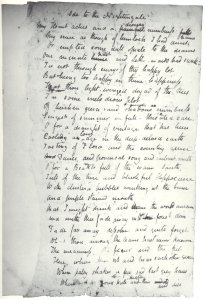En un sueño luego de leer sobre Paolo y Francesa en el Infierno de Dante
Como Hermes cuando agitó sus plumas ligeras
Mientras el arrullado Argos estaba atontado, desmayado,
Dormido, en un cañaveral de Delfos, así mi pereza voló,
Así jugué, así encanté, así conquisté, así despojé
Al dragón del mundo de sus cientos de ojos,
Y lo miré mientras dormía y volé muy lejos,
No para purificar a Ida con sus fríos esquíes de nieve,
Ni para ir a Tempe donde Júpiter penó algún día,
Si no para bajar a ese segundo círculo del triste Infierno
Donde entre las ráfagas, los torbellinos y los golpes
De la lluvia y el granizo los amantes no necesitan decir
Sus pesares. Pálidos eran los dulces labios que vi;
Pálidos eran los labios que besé y bella la forma
Que flotó conmigo sobre aquella melancólica tormenta.
John Keats, Moorgate, Londres 1795 - Roma, 1821
de Robin Hood y otros poemas, Selecciones de Amadeo Mandarino, Buenos Aires, 2001
Tratamiento: Jorge Aulicino
imagen de Dante Gabriel Rossetti
A
Dream, after Reading Dante’s Episode of
Paulo and Francesca
As Hermes once took to his feathers light,
When lulled Argus, baffled, swoone'd and slept,
So on a Delphic reed, my idle spright
So play'd, so charm'd, so conquer'd, so bereft
The dragon-world of all its hundred eyes;
And, seeing it asleep, so fled away -
Not to pure Ida with its snow-cold skies,
Nor unto Tempe where Jove griev'd a day;
But to that second circle of sad hell,
Where 'mid the gust, the whirlwind, and the flaw
Of rain and hail-stones, lovers need not tell
Their sorrows. Pale were the sweet lips I saw,
Pale were the lips I kiss'd, and fair the form
I floated with, about that melancholy storm.
As Hermes once took to his feathers light,
When lulled Argus, baffled, swoone'd and slept,
So on a Delphic reed, my idle spright
So play'd, so charm'd, so conquer'd, so bereft
The dragon-world of all its hundred eyes;
And, seeing it asleep, so fled away -
Not to pure Ida with its snow-cold skies,
Nor unto Tempe where Jove griev'd a day;
But to that second circle of sad hell,
Where 'mid the gust, the whirlwind, and the flaw
Of rain and hail-stones, lovers need not tell
Their sorrows. Pale were the sweet lips I saw,
Pale were the lips I kiss'd, and fair the form
I floated with, about that melancholy storm.




